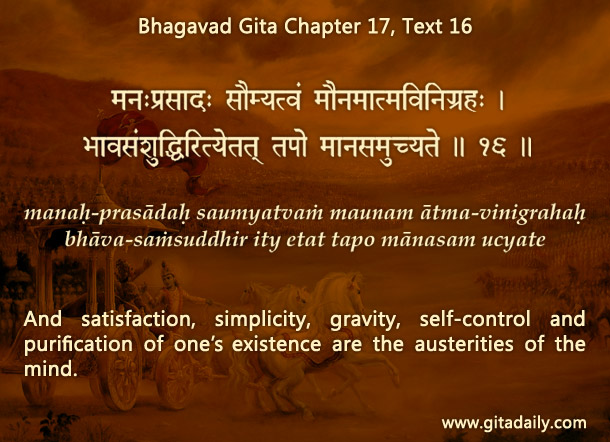Even if we are feeling miserable that doesn’t give us the right to make others miserable Gita 17.16
When something goes wrong in our lives, we may feel hurt, irritated, dejected. If we give in to bouts of self-pity and start repeating our sorry story to everyone around us, we become radiators of misery. Even if we just remain in a foul mood, those around us become tense and have to walk on tiptoe. Thus, we become unwitting demonstrators of the old saying: misery loves company.
That’s why we all have a responsibility to be happy. This doesn’t mean we suppress or deny our problems and put on a facade of happiness; it just means that we deal with our distress maturely. We need loved ones with whom we can unburden ourselves by sharing our fears, sorrows or irritations. But once such unburdening is done, we need to move on.
Suppose we have a physical wound. We need to get it treated by a doctor and then do what is needed for recovering, including informing those whose help we need during recovery. But beyond that, that wound doesn’t need to dominate all our discussions. We need to be similarly pragmatic in dealing with our emotional wounds.
Pertinently, the Bhagavad-gita (17.16) states that cultivating satisfaction is an austerity of the mind. To cultivate satisfaction, we need to focus on the things that are right in our lives, not on the things that are wrong. Gita wisdom expands our understanding of all that is right in our lives: we are at our core souls who are indestructible; we are parts of an all-benevolent Whole, Krishna, whose love for us is inexhaustible; if we harmonize with him, we can evolve spiritually toward lasting fulfillment even if things go downhill materially.
When we thus cultivate satisfaction as a voluntarily chosen responsibility, we learn to treat our emotional wounds without letting them infect everyone around us.
Think it over:
- How may we become unwitting demonstrators of the saying: misery loves company?
- How can we deal with our emotional wounds pragmatically?
- Is there any negativity in your life that you tend to wallow in? How can you change that?
***
17.16 And satisfaction, simplicity, gravity, self-control and purification of one’s existence are the austerities of the mind.
To know more about this verse, please click on the image
Explanation of article:
Podcast:


Leave A Comment